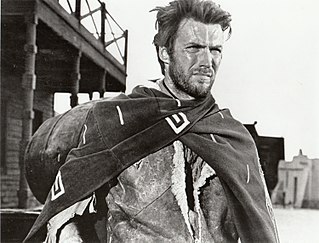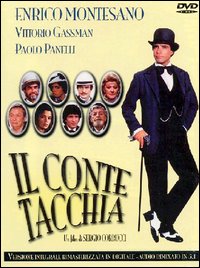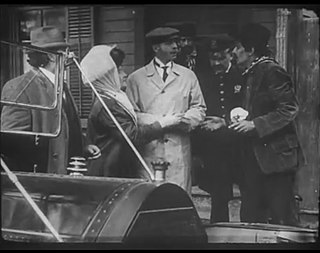
The spaghetti Western is a broad subgenre of Western films produced in Europe. It emerged in the mid-1960s in the wake of Sergio Leone's filmmaking style and international box-office success. The term was used by foreign critics because most of these Westerns were produced and directed by Italians.
1910 (MCMX) was a common year starting on Saturday of the Gregorian calendar and a common year starting on Friday of the Julian calendar, the 1910th year of the Common Era (CE) and Anno Domini (AD) designations, the 910th year of the 2nd millennium, the 10th year of the 20th century, and the 1st year of the 1910s decade. As of the start of 1910, the Gregorian calendar was 13 days ahead of the Julian calendar, which remained in localized use until 1923.

Oberhausen is a city on the river Emscher in the Ruhr Area, Germany, located between Duisburg and Essen. The city hosts the International Short Film Festival Oberhausen and its Gasometer Oberhausen is an anchor point of the European Route of Industrial Heritage.

Talia Rose Shire is an American actress, best known for her roles as Connie Corleone in The Godfather trilogy and Adrianne Pennino Balboa in the Rocky series. For her work in The Godfather Part II and Rocky, Shire was nominated for Academy Awards for Best Supporting Actress and Best Actress, respectively, and for the Golden Globe Award for Best Actress in a Drama for her role in Rocky.

Futurism was an artistic and social movement that originated in Italy, and to a lesser extent in other countries, in the early 20th century. It emphasized dynamism, speed, technology, youth, violence, and objects such as the car, the airplane, and the industrial city. Its key figures included Italian artists Filippo Tommaso Marinetti, Umberto Boccioni, Carlo Carrà, Fortunato Depero, Gino Severini, Giacomo Balla, and Luigi Russolo. Italian Futurism glorified modernity and, according to its doctrine, "aimed to liberate Italy from the weight of its past." Important Futurist works included Marinetti's 1909 Manifesto of Futurism, Boccioni's 1913 sculpture Unique Forms of Continuity in Space, Balla's 1913–1914 painting Abstract Speed + Sound, and Russolo's The Art of Noises (1913).

Emilio Salgari was an Italian writer of action adventure swashbucklers and a pioneer of science fiction.

Robert G. Vignola was an Italian-American actor, screenwriter, and film director. A former stage actor, he appeared in many motion pictures produced by Kalem Company and later moved to directing, becoming one of the silent screen's most prolific directors. He directed a handful of films in the early years of sound films, but his career essentially ended in the silent era.

Mario Caserini was an Italian film director, as well as an actor, screenwriter, and early pioneer of film making in the early portion of the 20th century. Caserini was born in Rome, Italy, and was married to early 20th-century Italian actress Maria Caserini. His 1906 film Otello is believed to be the earliest film adaptation of the William Shakespeare play Othello.
A list of some notable films produced in the Cinema of Italy ordered by year and decade of release For an alphabetical list of articles on Italian films see Category:Italian films.
The decade of the 1910s in film involved some significant films.

Segundo Víctor Aurelio Chomón y Ruiz was a pioneering Spanish film director, cinematographer and screenwriter. He produced many short films in France while working for Pathé Frères and has been compared to Georges Méliès, due to his frequent camera tricks and optical illusions. He is regarded as the most significant Spanish silent film director in an international context.
Anthony O'Sullivan was an American silent film actor and film director. He appeared in more than 160 films between 1906 and 1918. He also directed 35 films between 1913 and 1915. He died in The Bronx, New York

Futurism was an early 20th-century art movement which encompassed painting, sculpture, poetry, theatre, music, architecture, cinema and gastronomy. Filippo Tommaso Marinetti initiated the movement with his Manifesto of Futurism, published in February 1909. Futurist music rejected tradition and introduced experimental sounds inspired by machinery, and influenced several 20th-century composers. According to Rodney Payton, "early in the movement, the term ‘Futurism’ was misused to loosely define any sort of avant-garde effort; in English, the term was used to label a composer whose music was considered ‘difficult.’"

Gennaro Righelli was an Italian film director, screenwriter and actor. He directed more than 110 films in Italy and Germany between 1910 and 1947. In 1930, he directed the first Italian sound film, The Song of Love. He was married to the film star Maria Jacobini, whom he frequently cast in his films.

Sante Monachesi (1910–1991), was an Italian painter belonging to the modern movement of the Scuola romana and founder in 1932 of the Movimento Futurista nelle Marche .

Il conte Tacchia, internationally released as Count Tacchia, is a 1982 Italian comedy film directed by Sergio Corbucci.

Jane Eyre is a 1910 American silent short classic drama produced by the Thanhouser Film Corporation. Adapted from Charlotte Brontë's 1847 novel, Jane Eyre, the film mirrors the events and plot of the original book. The writer of the scenario is unknown, but Lloyd Lonergan probably adapted the work. The film's director is often and erroneously claimed to be Theodore Marston, but Barry O'Neil or Lloyd B. Carleton are possible candidates. The cast of the film was credited, an act rare and unusual in the era.

The Two Roses is a 1910 American silent short drama produced by the Thanhouser Company. The film focuses on the young Tony Prolo who goes to deliver lunch to his father of the same name. After arriving and giving him his lunch, the young Tony is hit by a passing vehicle and the father rushes his son home. Mr. Sears, whose car hit the child, receives a demand for $10,000 by the "Black Hand". The Sears go to the police and set a trap for the Black Hand, but end up wrongly arresting the child's father. Tony convinces the police to investigate further and the confusion is cleared up when the real culprit is caught. Mr. Sears compensates the family by purchasing them a house in the countryside. The film features Marie Eline, cast in the role of an Italian boy, along with the leading players Frank H. Crane and Anna Rosemond as the parents. The film was released on June 7, 1910. The film survives with new inter-titles that were created to replace the lost materials.

Jolanda Kodra (1910–1963) was an Italian-Albanian writer and translator, one of the first woman writers in the Albanian language, as well as a translator into the Italian language of the works of Albanian writers, such as Ndre Mjeda, Migjeni, Petro Marko, and Sterjo Spasse.

The Champion Film Company was an independent production company founded in 1909 by Mark M. Dintenfass. The studio was one of the film companies that merged to form Universal Pictures.

















